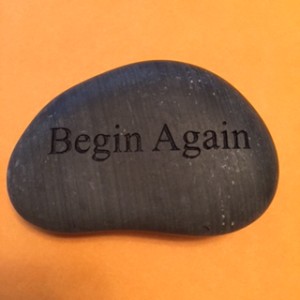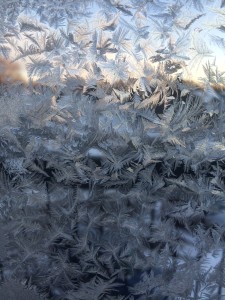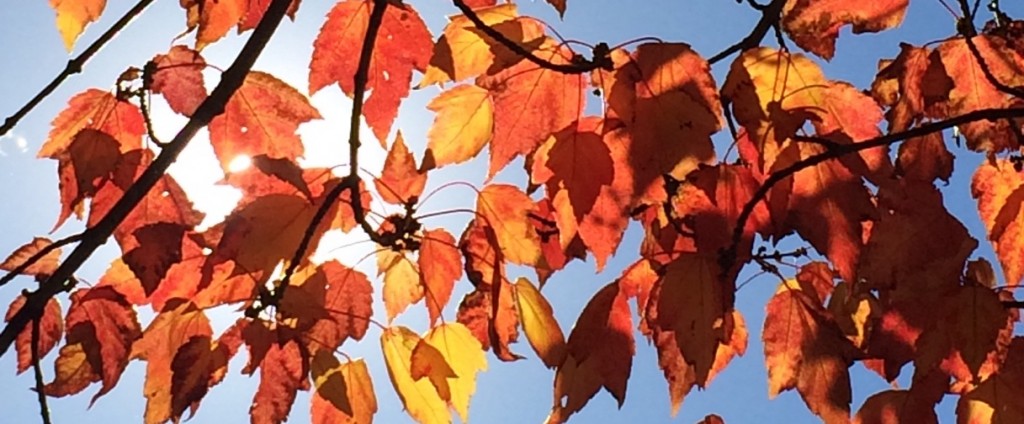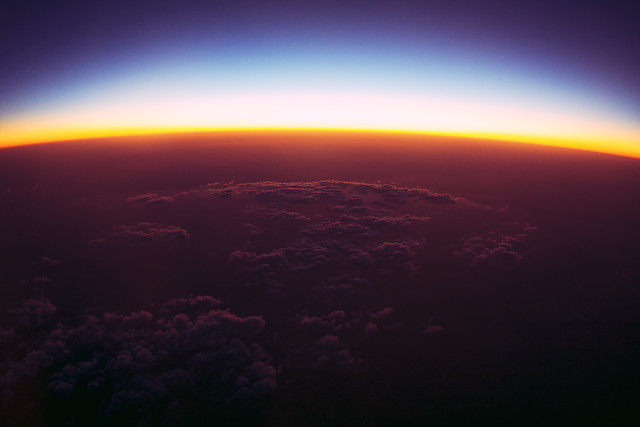The imaginers, creators, researchers, and movers behind SimplySomatic.com recognize the importance of the feedback loop between our voice and the voices of you, our audience. On this blog you will find our somatic musings of the week. We hope these thoughts will inspire you to begin or participate in a conversation with users of this website by replying to our posts, by introducing or discussing topics in our forum, or by joining our network of somatic movers, SomaticMe!
Begin Again….
…is an intention that I place at the start of every new day. I  remind myself by putting a small rock with Begin Again chiseled into it in a place I will notice—by my bed, on the bathroom sink, in front of my computer. It offers me the possibility of a fresh start. Whatever is spilling over from yesterday is caught in these two simple words: begin again. I pause to greet a new day unencumbered by yesterday, even if yesterday was a pretty good day. Today is a new day with its own open ended options. And I am looking forward to moving through those options!
remind myself by putting a small rock with Begin Again chiseled into it in a place I will notice—by my bed, on the bathroom sink, in front of my computer. It offers me the possibility of a fresh start. Whatever is spilling over from yesterday is caught in these two simple words: begin again. I pause to greet a new day unencumbered by yesterday, even if yesterday was a pretty good day. Today is a new day with its own open ended options. And I am looking forward to moving through those options!
Just like Riding a Bike
I will pause for you to check out this video of a grown man failing to ride a bike.
Back yet? Great.
He says, “I had the knowledge of how to ride the bike, but I did not have the understanding.” At first the solution seems simple; in order to turn the bike turn the handle in the opposite direction, yet we still see him fall. He explains the “algorithm” for riding a bike is much more complex than compensating for an opposite turn of the handle. In fact, the process for riding a bike is much more body-intuitive than we understand, and it is the entire nervous system that must cooperate with problem solving cognition to accommodate the change of one gear.
In his first attempt to ride the bike, he tries to turn the bike as normal. The weight of his body leans forward and into the turn while his arms turn the handle into the turn, causing the wheel to turn the opposite direction. His weight is then unsupported by the front of the bike and he falls. In his next few attempts he learns to turn the handle the away from the turn causing the wheels to turn the correct direction, but his body still can’t figure out how to distribute its weight over the bike so that its relationship to both the handle bar and to the front wheel is optimized for balance. As his lecture participants discover, it isn’t just turning that is challenging with the new bike. Riding in a straight line is made up of hundreds of mini-turns and adjustments of the body that also depend on this relationship.
The body and the bike are not one system together. The body is a system within itself and so is the bike, but the relationship between body and bike is not single fold. As he says in the video, there are multiple forces that contribute to riding a bike, and the body has a relationship to every single one simultaneously. Changing one part of bike’s system breaks all known relationships between body and bike, and a new simultaneity of forces must be learned… and not just in the brain. Its a job for the entire nervous system.
Thorough his experiment, not only does he demonstrate plasticity of the brain to learn a new skill, but he also demonstrates plasticity of the body. Its clear just how dependent our experience of living is on our own weight, sensations, and perceptions. We build relationships with tools and other things in this world not because we understand them, but because the body understands itself in relationship to them. So, in the end, solving this problem of riding the changed bike isn’t really about understanding the bike at all, its about understanding yourself on the bike.
Symbols of Curiosity
 Its interesting how, through some unspoken, cultural/social agreement, objects come to symbolize more complex concepts than the function they serve or the stuff they are made of. We attach feelings and sensations we experience when we are doing whatever we do when we utilize objects, so then the object comes to represent the wholeness of that experience. This is how a telescope becomes more than a series of mirrors and glass inside a tube. A telescope, a magnifying glass, both objects that help us know more about our world than we can witness on our own. How interesting it also is that these tools that signify curiosity are primarily used by a single sense: sight. But how many other ways there are to exercise curiosity and to learn than just by looking?!
Its interesting how, through some unspoken, cultural/social agreement, objects come to symbolize more complex concepts than the function they serve or the stuff they are made of. We attach feelings and sensations we experience when we are doing whatever we do when we utilize objects, so then the object comes to represent the wholeness of that experience. This is how a telescope becomes more than a series of mirrors and glass inside a tube. A telescope, a magnifying glass, both objects that help us know more about our world than we can witness on our own. How interesting it also is that these tools that signify curiosity are primarily used by a single sense: sight. But how many other ways there are to exercise curiosity and to learn than just by looking?!
Ice Feathers
Wonder. Wonder c an be a catalyst to curiosity. When I stand in wonder of the world around me (or inside me!) I am opened to all its brilliant capacities. Artists and psychologists talk about an open flow state of being where curiosity bubbles and creativity flourishes simply because they are open. There is more space for new to bubble through.
an be a catalyst to curiosity. When I stand in wonder of the world around me (or inside me!) I am opened to all its brilliant capacities. Artists and psychologists talk about an open flow state of being where curiosity bubbles and creativity flourishes simply because they are open. There is more space for new to bubble through.
When I woke to see this in my world. At first I wondered, how? Then, how beautiful! SO, this year let us stand in Wonder and be Opened.
The Neurostorm
The dictionary classifies and defines curiosity as a noun, related to a particular kind of “desire,” (remember this image?) also a noun, related to a “feeling,” (an emotion,) of wanting, (verb, gerund.) So we end up with curiosity as an action. Curiosity is the active pursuit of understanding. If you’ve listed to Part 2 of our August 1st Podcast, you’ve heard the question, “What does curiosity feel like?” Is it just an intellectual experience, or is curiosity also an emotion or even a sensation? Jason de Silva describes curiosity as “an exhilarating neurostorm of intense intellectual pleasure.” Activity. I find “pleasure” too passive here, as if you can sit outside the storm, “satisfied” with rage, and excitement, and its motion, its rather than swept up in awe from within it, or better yet helping to stir it!

The Neurostorm

Jupiter’s Swirling Storm, “The Red Spot”
de Silva also claims knowledge or “understanding” is curiosity’s vital end-goal. This may be, (or it may not..!) but this vision illuminates curiosity as process. It is learn-ing. It is creat-ing. One could argue that curiosity merely initiates action, ( “I was curious about x, so then I researched x,” ) suggesting curiosity is merely an intention that plays not further role once action takes over. However, when curiosity and action are conceptualized separately, we exclude ourselves from the excitement of learning and the richness of a result brought about by continued questioning.
But still, a neurostorm. What amazing motion that image inspires! What if you could feel your neurons firing, sending messages to one another through spatially chaotic yet intellectually organized networks inside your body. To feel that urgency. To feel that excitement. To feel the swirling whirlwind of infinite possibilities that exist in a moment that is pre-knowledge, pre-wisdom, and pre-judgement. Most importantly it is a sense of freedom within uncertainty. For many uncertainty is an intellectual sensation often met with fear and discomfort, yet curiosity allows us to meet this road with eagerness.
So, what does curiosity feel like to you? How can you shape moments of uncertainty in your life with curiosity?
The Best Questions
“No one is dumb who is curious. The people who don’t ask questions are lost throughout their lives”-Neal deGrasse Tyson
The best All questions lead to more questions.
Take an object that you interact with every day and pose to yourself a new question about it. Find this difficult? Consider, then, your assumption that you know everything there is to know about your object. Your knowledge of it is infinite. Is it?
Now go back to your object and think of a question.
Begin Again
Let’s turn over a new leaf.
 I find it somewhat ironic that many of our so-called “beginnings” happen two thirds of the way through our calendar year. Having recently graduated from college I find myself living a new life, in a new apartment, working a new job, making new friends, keeping track of new responsibilities. For students and educators, the entire year is new on the brink of fall. Even in other sectors, labor day marks the last vacation opportunity of the summer, and schedules return to 9-5.
I find it somewhat ironic that many of our so-called “beginnings” happen two thirds of the way through our calendar year. Having recently graduated from college I find myself living a new life, in a new apartment, working a new job, making new friends, keeping track of new responsibilities. For students and educators, the entire year is new on the brink of fall. Even in other sectors, labor day marks the last vacation opportunity of the summer, and schedules return to 9-5.
It is a beginning.
But, where does this perception of beginning again come from? We look around and leaves are changing color, and falling to the ground. They dry and crunch beneath our shoes. Flowers are dying, and animals scurry around gathering food to fall asleep for four months. Hardly the dawn of life that we also associate with things made new. Certainly we are surrounded by change but are we really experiencing a world made new? Any time something is new, the old has changed, but the world exists in continual change, so why not celebrate it throughout the year?!
things made new?
So take this challenge: this week, and at the end of November, and in February and next July, to wake up and consider what there is that wasn’t the day before, and how your yesterday molded a new today.
On the Edge of the Earth
Sunrise yoga.
The hill looks out over the sleeping college town as it rolls into the day. The sun peeks over the hill and I am filled with a knowledge that in that moment I am standing at a perceptual “edge” of the Earth. I am standing at the brink as the Earth (or at least my corner of it) prepares to renew itself. We often think of an “edge” as a place where solid material meets open space, but I don’t need to stand atop an intense vertical drop to sense this shift. Instead time has given me this sense of standing in that precarious place, where anything is possible, because of course, that is exactly what dawn is.

Edge of the Earth at Dawn
A Place at the Table
I’ve been reading A Place at the Table by Susan Rebecca White this month and its one of those misfit-people stories told from the perspectives of multiple individuals, all of whom feel alienated from one community or another. On occasion this summer, the community I’ve felt alienated from is myself. I work a job where I sit at a desk all day and enter data into a computer. I’ve accepted a job for the fall where I schedule sales meetings for a publishing executive. Data entry? sales? caller? What is this life that i’ve arranged for myself? Certainly nothing my essence accepts. I get hungry at odd hours from the what I call body-static, I don’t get to go outside when the sun is high to feed my soul, and I stress about finances. but when i get to dance, i find my place at the table.
Earlier this summer I had the opportunity to audition for a dance company in the cities, assistant teach at a studio, and volunteer for an outdoor choreographic event at a modern art museum. Every time i’ve left a dance experience this summer I’ve felt more energized and inspired than when I arrived, and thats how I know i’m in the right place. I’m looking toward the right path, all I have to do is keep going. Thats how I know I belong
Play on your Feet!
Its play. Play the piano. Play hot-potato feet. Play together. Play using your body. Play with focus. Play you.
